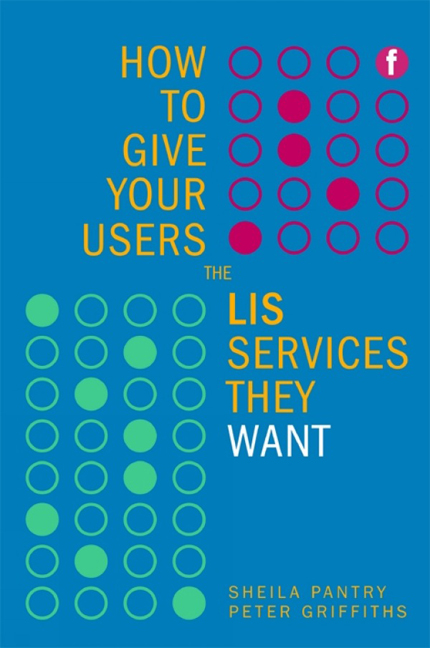Book contents
- Frontmatter
- Contents
- Preface
- 1 Why this book?
- 2 Understanding users – the what, why, where, when, how and who
- 3 What is the current knowledge about your users and their needs – is it really predictable?
- 4 Great expectations: how LIS professionals can manage and train users
- 5 Using information about past user behaviour
- 6 Making the most of knowing your users
- 7 Keeping track of changes in what users want
- 8 Tracking the future
- 9 Future perfect?
- Appendix 1 Reading list and references
- Appendix 2 Where to go for further information
- Index
7 - Keeping track of changes in what users want
Published online by Cambridge University Press: 08 June 2018
- Frontmatter
- Contents
- Preface
- 1 Why this book?
- 2 Understanding users – the what, why, where, when, how and who
- 3 What is the current knowledge about your users and their needs – is it really predictable?
- 4 Great expectations: how LIS professionals can manage and train users
- 5 Using information about past user behaviour
- 6 Making the most of knowing your users
- 7 Keeping track of changes in what users want
- 8 Tracking the future
- 9 Future perfect?
- Appendix 1 Reading list and references
- Appendix 2 Where to go for further information
- Index
Summary
In this chapter we look at:
➡ helping users to review their information needs
➡ how to keep track of changes in what users want
➡ how and where to find information about their changes
➡ surveys and statistics
➡ wider uses of information professional skills: reputation management
➡ know your users: building user loyalty and keeping it
➡ what next?
Helping users to review their information needs
At the end of the day it is the customer who really decides the quality of the services, by:
• making demands for improvements on an existing service
• asking for new services
• being willing to co-operate.
How do users express these demands and identify the need for new services? Here is the ideal opportunity to use information audit as a technique both to discover the information assets within the organization and to create a record of the ways in which your patrons are using them. It is also far more likely than when we originally developed our ideas of information audit that you will find information users who are quite content to be non-patrons of the LIS because they believe that the internet and other informal sources are accurately meeting all their requirements.
From your surveys of the users you will have knowledge of their information-seeking behaviour patterns. Under various headings we look at how to implement better strategic planning, the cost benefits and better use of budgets, better marketing and advertising, short and longer term gains and most of all at satisfied customers, wherever they are located and a very satisfied (but not complacent) management.
We cannot state too many times that the LIS manager and staff must ensure that the LIS should be central to the organization whatever the sector. If not, as we risk the dire consequences or cuts and decimation of services themselves. (This point is reinforced by Ford (2002) in the context of performance measurement.)
We noted a moment ago that users should expect to be willing to co-operate with the LIS. One way would clearly be to participate in surveys of requirements and use (and small incentives seem to work as well as anything more formal), but another means of co-operation is to observe licence terms and copyright.
- Type
- Chapter
- Information
- How to Give Your Users the LIS Services They Want , pp. 87 - 96Publisher: FacetPrint publication year: 2009



